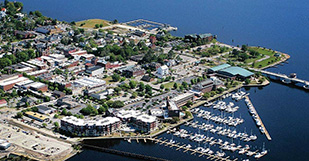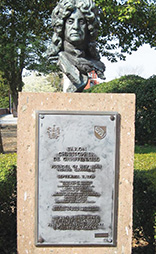by Edward Ellis, Special Correspondent
In his native tongue, he’s known as Christoph von Graffenried. The anglicized version of the name is Christopher DeGraffenried. No matter what you call him, he’s best known as the principal founder of New Bern, North Carolina.
In 1710 two groups of settlers—mostly religious refugees from Switzerland and Germany—arrived in the Neuse River basin under his sponsorship. DeGraffenried’s friendship with Queen Anne of England, and association with explorer John Lawson, Swiss agent Frantz Ludwig Michel (Louis Michel), and the Lords Proprietors resulted in an attempt at colonization in North Carolina.
While the portrait reproduced nearby was considered to be a member of the Swiss DeGraffenried family, a proven likeness of Christopher DeGraffenried was debated through the mid-to-late 1900s. Nevertheless, slowly over the years, this image gained acceptance at that of New Bern’s founder.
New Bern’s establishment was fraught with peril. Many of the European refugees – fleeing hunger, disease, and war – were faced with the same obstacles during their perilous voyage across the Atlantic and during the immediate months after their landing on the fork of land formed by the conjunction of the Neuse and Trent rivers. It’s thought that as many as half of the colonists perished on the first leg of the journey. More died of illness soon after the 1710 founding. And when things were finally looking up, a savage attack by the indigenous population of eastern North Carolina left more dead and most of the village a smoking ruin.
Though challenged by this series of disasters, which may have made even the founder himself believe the little colony was a failure, the foundation of modern-day New Bern was laid by DeGraffenried and his cohort. The site has been continuously occupied since those early times and, as we know, is today a thriving, popular, and picturesque municipality.
DeGraffenried was born in the village of Worb in the Canton (or State) of Bern, Switzerland in early November 1661. The family had been there for generations. His father, Anton, was a government bureaucrat with the title Herr (Lord) of Worb. The father, while not wealthy, had a secure political position. Through a combination of thrift, and conservative, honest business dealings, Anton was able to accumulate a considerable estate over many years of hard work. The father has been described as unaffectionate in his family life and did not well-tolerate his son’s rambunctious spirit. The father and son were never close and Christopher’s independence of mind was further developed by the early loss of his mother. He was cared for by a stepmother for a short time and then sent away to boarding school. Although quite intelligent, he did not give his best effort in his studies there.
As a youth, DeGraffenried traveled and attended classes at European universities—in Heidelberg and Leyden. Popular and outgoing, his family’s rank gave him access to the upper echelons of society. He was introduced to kings, queens, princes, dukes, and earls, as well as many of the leading businesspeople of his day.
At fifteen his father endeavored to arrange a marriage, but a business squabble broke off the relationship. In 1682, after a series of adventures and misadventures in England, DeGraffenried fell in love with the niece of the Duke of Buckingham. The young man had inherited twenty thousand pounds from his mother’s estate, but after his travels, had spent all the money. He planned to purchase a military commission—a common practice at the time—which would provide the income necessary to support a wife. He wrote home and asked his father for a loan with which to buy the military office. The reply was for him to come home immediately. His refusal, he was told, would result in his expulsion from the family and all the future wealth and position to which he might one day be entitled.
He returned home in 1663 and the following year agreed to an arranged marriage with Regine Tscharmer. His appointment to the position of bailiff proved unsuccessful. He made bad investments and fell further into debt. He soon began looking for a grand project with the potential to provide a much-needed change in fortune. Through his political connections and his charming and persuasive manner, he soon became involved in the American colonization venture that he hoped would be profitable.
His effort failed. “No good star shone for me,” DeGraffenried would say in summation of his experience with the North Carolina colony. He returned to Switzerland in 1714 and died there in 1743 at age 82. He is buried in the family crypt in Worb.
Perhaps today from some heavenly realm, the founder is looking down to see his dream still prospering in America.
Article adapted from the writer’s book, New Bern History 101.



